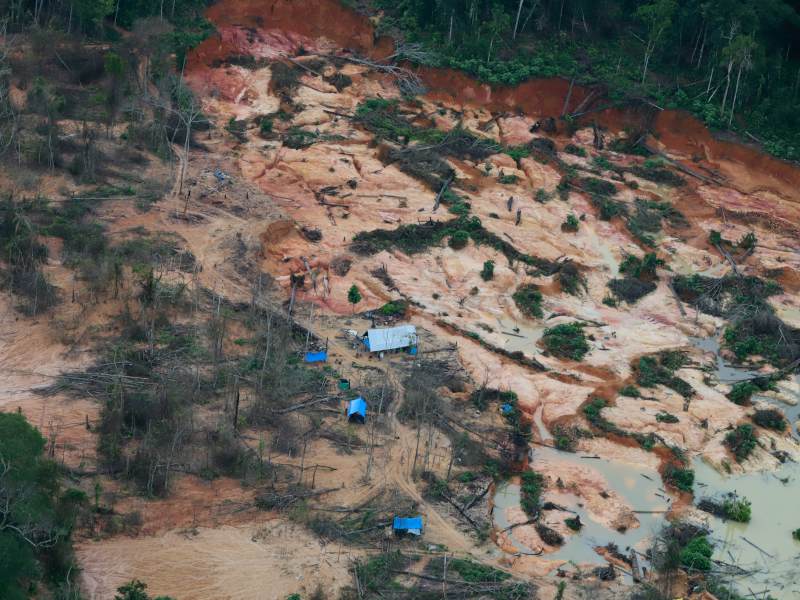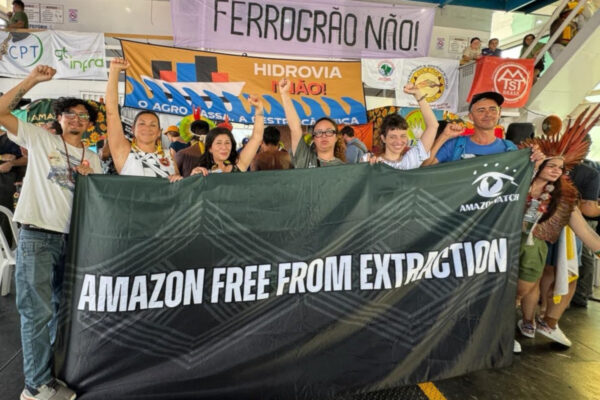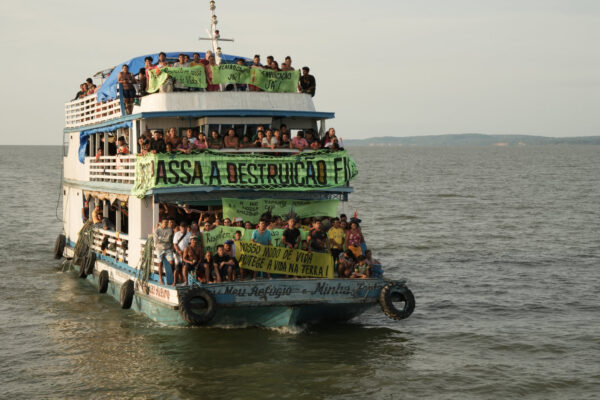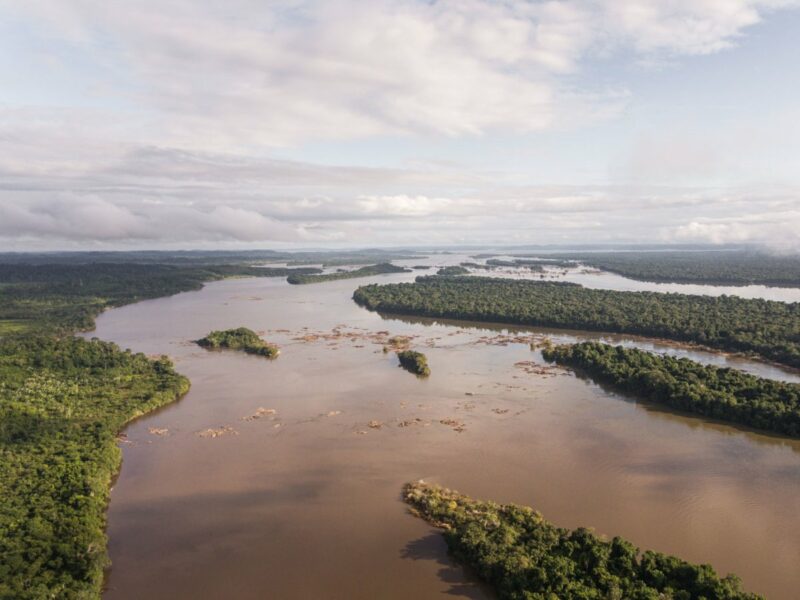“We, the Yanomami people, have long been forced to live with the invasion of illegal mining. Miners are contaminating our rivers with mercury, carving out our lands, and killing our animals and our environment. Our health is poor as a result of drinking water contaminated by mining. Right now, they could potentially infect almost half of our people, who live in villages invaded by mining.”
Dario Kopenawa Yanomami, leading spokesperson for the International #MinersOutCovidOut campaign
Indigenous people across the Amazon are battling the coronavirus pandemic. They are losing their elders and with them, their living “libraries” and the memories of their history and culture. They are also losing their babies, leaders, and young warriors, but not only to the virus.
Indigenous communities in the Amazon have long resisted industrial and wildcat mining operations on and around their territories. Today their struggle continues, amid rising efforts to pillage native lands. Many Indigenous communities like the Yanomami, in Brazil’s Roraima state on the border with Venezuela, are actively resisting the theft of their lands. And as the COVID-19 crisis continues to intensify, they have launched an international campaign to immediately expel 20,000 wildcat miners from their territory.
Learn more about the #MinersOutCovidOut campaign here
Historically, illegal mining activities have caused serious environmental harm while forcing Indigenous communities to bear the brunt of their multifaceted impacts. Wildcat mining drives widespread invasions of Indigenous lands, and they are generally imposed on Indigenous communities against their will. Mining causes severe water pollution by poisoning sources of fresh water and fish with mercury. The social impacts and physical threats are significant and violate the rights of Indigenous peoples, as mining sites are also hot spots for human and drug trafficking and the spread of diseases like COVID-19. The illegal miners’ unwanted presence and the harm they cause contribute to conflict. History describes a cyclical, fraught relationship between the Yanomami and wildcat miners ever since the Indigenous territory was invaded by more than 40,000 wildcat miners in the 1980s.
Illegal mining is exploding under Bolsonaro
According to Article 231 of the Brazilian Constitution, any garimpo (informal mining activity) within Indigenous lands is illegal. In March, Brazil’s national Indigenous agency FUNAI determined that the entry of civilians to Indigenous lands should be restricted to prevent the spread of the pandemic, and it suspended all activities involving contact with isolated Indigenous communities. However, illegal activities on Indigenous territories have increased, due to the government’s active dismantling of environmental policies, President Bolsonaro’s racist rhetoric against Indigenous peoples, and the dramatic increase in the price of gold on the global market.
The Brazilian government is complicit in this disaster by encouraging these illegal activities and by proposing measures to weaken environmental legislation such as the “Land Grabbing” Bill, a proposed law aiming to open Indigenous lands for the exploitation of mineral and water resources, and a FUNAI resolution which puts hundreds of territories at risk of invasion as their official land titling processes languish indefinitely. This package of policy proposals intends to definitively open once-protected Indigenous lands to a range of industrial threats and contribute to increased criminality and impunity.
#MinersOutCovidOut Campaign by Yanomami aims to expel 20,000 illegal miners
The #MinersOutCovidOut campaign is an initiative of Yanomami and Ye’kwana Leadership Forum, together with other Indigenous organizations and several organizational allies. “We will fight and resist. But we need support from the Brazilian people and people all over the world,” said Dário Kopenawa Yanomami, the campaign’s leading spokesperson. Dário is a young leader of his people, son of the globally-renowned leader and shaman Davi Kopenawa, and vice president of the Hutukara Yanomami Association.
The campaign is calling for global action to demand that the Brazilian government immediately remove more than 20,000 gold miners currently operating illegally in Yanomami territory. These miners are carriers of COVID-19 and agents of violence against Yanomami communities. The international campaign and its petition have already gained support from over 300,000 people around the world.
Last week, in a statement denouncing the murder of two Yanomami people by armed illegal gold miners in their territory, the Hutukara Yanomami Association raised fears that land invaders are driving a disastrous cycle that echos past genocidal violence.
“The murder of two more Yanomami by miners reinforces the need for the Brazilian state to act urgently and immediately remove all the miners who are illegally exploiting the Yanomami Territory while harassing and assaulting the Indigenous communities who live there. We call on the authorities to take all necessary measures to stop the mining which continues taking Yanomami lives,” said the Hutukara statement.
In Brazil, almost 10,000 Indigenous people have tested positive so far for the new coronavirus and almost 400 have died according to the Association of Brazil’s Indigenous Peoples (APIB). The Indigenous mortality rate is double that of the rest of Brazil’s population. The disease has already killed five Yanomami, and there are 170 more confirmed cases among the Yanomami and Ye’kwana.
“This moment is causing my people and me a lot of pain. Elderly people have survived a long time, cared for many families, and led our community,” said Dario Kopenawa Yanomami. “The elderly hold generational memory and pass on Yanomami history. When they die, we lose a piece of history from the first people born in the forest, even as other leaders continue to teach the new generations.”
A new study shows that in a worst-case scenario COVID-19 could infect as much as 40 percent (5,603) of the Yanomami people who live closest to invaded wildcat mining areas. Roughly half of the Yanomami territory’s population live in communities less than five kilometers (about three miles) from an illegal mining site, and the study calculates different scenarios for transmission rates in those villages. In one region of the Yanomami territory, a single case of COVID-19 could result in 962 new cases after 120 days. If the mortality rate remains twice as high as the non-indigenous population, between 207 and 896 Yanomami could die as a result of COVID-19, up to 6.4 percent of the population in those areas. They face a real risk of genocide.
Amazon Watch is supporting this important and urgent call from the Yanomami to the world, together with the Association of Brazil’s Indigenous Peoples (APIB), the Coordination of Indigenous Organizations in the Brazilian Amazon (COIAB), the Socio-environmental Institute (ISA), Survival International, Greenpeace Brazil, Conectas Human Rights, Amnesty International Brazil, Amazon Cooperation Network (RCA), Igarapé Institute, Rainforest Foundation US and Rainforest Foundation Norway.
Canada’s Belo Sun mining portends an unacceptable degree of risk
As illegal mining spreads across the Brazilian Amazon, the global mining sector is poised to wreak destruction on an industrial scale. The Canadian mining company Belo Sun is helping to lead the charge, with plans to carve the country’s largest open-pit gold mine into the margins of the Amazon’s Xingu River and directly adjacent to two Indigenous territories.
Amazon Watch has a history of working with Indigenous communities and allied organizations resisting the construction of the Belo Monte Dam on the Xingu. Belo Sun’s “Volta Grande Project” was announced shortly after the campaign to stop Belo Monte failed, threatening to gravely exacerbate the megadam’s disastrous consequences.
Last month, Amazon Watch joined a coalition led by Rede Xingu+ and the Xingu Alive Movement working to scrutinize the proposed mega-mine’s environmental impact assessment (EIA), by commissioning a technical assessment of its waste facilities – known as its tailings dam – to assess the social and environmental viability of Belo Sun’s mining project considering the grave risk to Indigenous and other river-dwelling communities.
The resulting study revealed the EIA’s serious deficiencies and exposed an unacceptable degree of risk, resulting in a scenario where the tailings dam at the proposed Volta Grande gold mine will fail, poisoning the Xingu River and the peoples who rely on it for survival. Based on his findings, the report’s author, Dr. Steven Emerman, recommends that the project’s license be revoked. Other technical evaluations of Belo Sun’s shortcomings have pointed toward the same recommendations.
This isn’t the first time Belo Sun has failed to study the impact on Indigenous and other traditional communities, and to consult these populations. In 2017 Brazilian courts suspended Belo Sun’s installation license for similar reasons.
While important, these efforts offer no guarantee that Belo Sun’s disastrous project, and others like it being proposed on Indigenous territories, will be halted, especially given the Bolsonaro regime’s utter disregard for Brazilian environmental regulation and the rule of law.
Ending illegal gold mining In Brazil requires global action
Illegal gold mining in the Amazon is not new, and it’s a complex matter. It is also a dangerous occupation that requires the exploitation of poor people by middlemen connected to mafias or formal businessmen that work in the shadows, protected by flawed regulations and lack of surveillance, many times with the complicity of local authorities.
The supply chains for illegal gold are notoriously difficult to track, given that once the gold is melted together it’s impossible to identify the legality of its origin. This dynamic creates challenges for consumer-facing pressure and demands upon gold buyers and refiners to conduct quality certifications that could undermine demand for this toxic commodity.
Meanwhile, a catastrophic industrial mining rush faces the Amazon and its peoples, unless international investors and leaders in the global mining sector are persuaded to take their business elsewhere. Without financing and willing buyers, Belo Sun and other companies like it, would have little incentive to take advantage of Bolsonaro’s craven pandering to the mining industry.
Complex situations demand creative solutions. The work of many people and institutions together in coalition create possibilities to make real change. The COVID-19 crisis has created new urgency to address the parallel pandemic of Amazon mining. If the world acts now, Indigenous peoples won’t have to face imminent tragedy.














